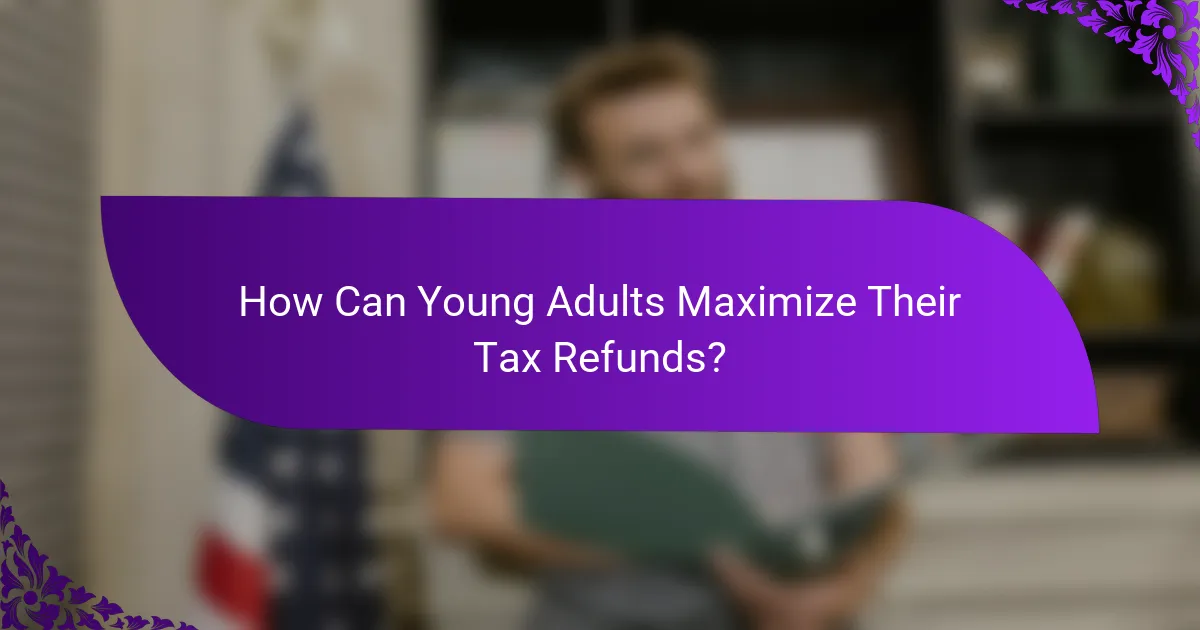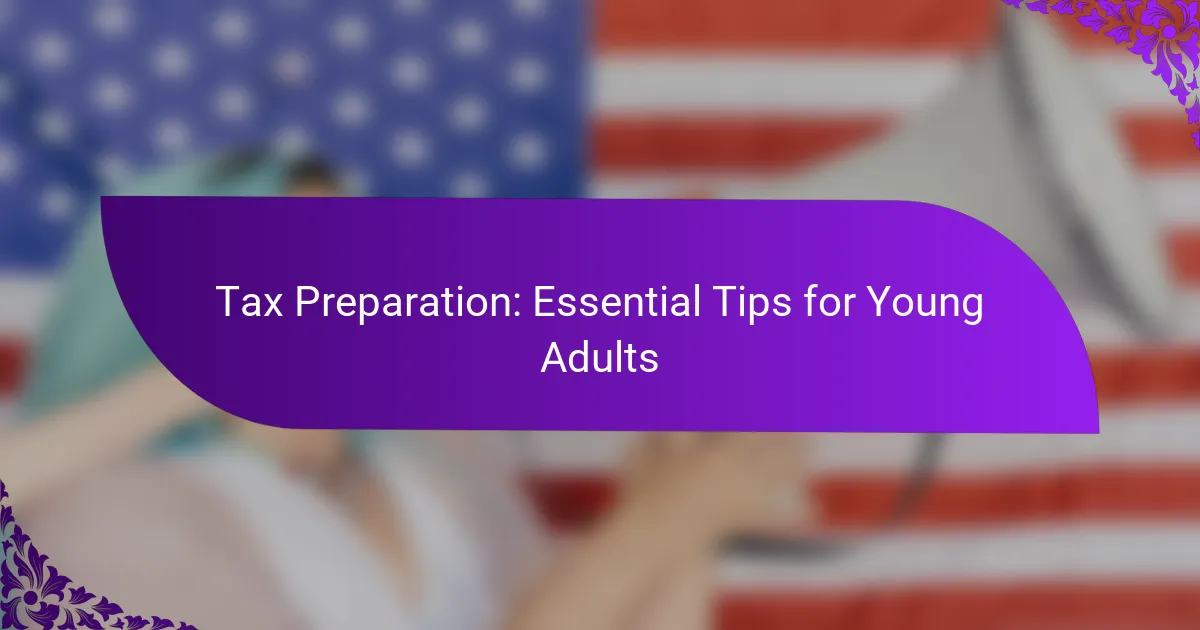Tax preparation can be a daunting task for young adults, but with the right strategies, it can become a manageable process. By focusing on organization, understanding available deductions and credits, and considering professional help, young adults can minimize stress and maximize their potential refunds. Being aware of common mistakes can further enhance their filing experience and financial outcomes.

What Are the Best Tax Preparation Tips for Young Adults?
Young adults can streamline their tax preparation by focusing on organization, understanding deductions, utilizing software, considering professional assistance, and filing early. These strategies can help minimize stress and maximize potential refunds.
Organize Financial Documents
Keeping financial documents organized is crucial for efficient tax preparation. Gather all necessary paperwork, including W-2s, 1099s, bank statements, and receipts for deductible expenses. Use folders or digital tools to categorize these documents by type to make the process smoother.
Consider creating a checklist of required documents to ensure nothing is overlooked. This can include proof of income, educational expenses, and any other relevant financial records that may affect your tax return.
Understand Tax Deductions
Tax deductions can significantly reduce your taxable income, so it’s essential to understand which ones apply to you. Common deductions for young adults include student loan interest, education expenses, and certain work-related costs.
Familiarize yourself with the standard deduction limits, which can vary based on your filing status. For many young adults, taking the standard deduction may be more beneficial than itemizing, especially if your eligible expenses are low.
Use Tax Software
Tax software can simplify the filing process by guiding you through each step and ensuring you don’t miss any deductions. Many programs offer user-friendly interfaces and can automatically calculate your tax liability.
Look for software that suits your needs, whether you have a simple return or more complex financial situations. Some options are free for basic filings, while others charge a fee for advanced features.
Consider Professional Help
If your financial situation is complicated, seeking professional help from a tax advisor or accountant may be wise. They can provide personalized advice and ensure compliance with tax laws, potentially saving you money in the long run.
When choosing a tax professional, consider their qualifications, experience, and fees. A good advisor can help you navigate complex deductions and credits that you might overlook on your own.
File Early to Avoid Penalties
Filing your taxes early can help you avoid last-minute stress and potential penalties. The IRS typically allows you to file as soon as you have all your documents, which can be as early as January.
Filing early also gives you more time to address any issues that may arise, such as discrepancies in your documents. Additionally, if you expect a refund, filing sooner means you’ll receive your money faster, which can be beneficial for budgeting or paying off debts.

How Can Young Adults Maximize Their Tax Refunds?
Young adults can maximize their tax refunds by taking advantage of available credits, deductions, and contributions. Understanding these options can significantly increase the amount refunded or reduce tax liabilities.
Claim Education Credits
Education credits, such as the American Opportunity Credit and the Lifetime Learning Credit, can provide substantial savings for young adults pursuing higher education. The American Opportunity Credit allows for a credit of up to $2,500 per eligible student for the first four years of college, while the Lifetime Learning Credit offers up to $2,000 per tax return for qualified tuition and related expenses.
To claim these credits, ensure you have Form 1098-T from your educational institution, which details tuition payments. Keep in mind that income limits apply, so check the IRS guidelines to see if you qualify.
Utilize Retirement Contributions
Contributing to retirement accounts like a 401(k) or an IRA can not only secure your future but also reduce your taxable income. For 2023, individuals can contribute up to $22,500 to a 401(k) and up to $6,500 to an IRA, with additional catch-up contributions available for those over 50.
Consider contributing enough to your 401(k) to receive any employer match, as this is essentially free money. If you’re eligible for a Roth IRA, contributions are made with after-tax dollars, allowing for tax-free withdrawals in retirement, which can be a strategic advantage.
Track Medical Expenses
Tracking medical expenses can lead to significant deductions if they exceed a certain percentage of your adjusted gross income (AGI). For the tax year 2023, you can deduct qualifying medical expenses that exceed 7.5% of your AGI. This includes costs for doctor visits, prescriptions, and certain treatments.
Keep detailed records of all medical expenses throughout the year. Use a spreadsheet or budgeting app to categorize and total these expenses, making it easier to claim deductions when filing your taxes. Be cautious, as not all medical expenses qualify, so familiarize yourself with IRS guidelines to ensure you maximize your deductions without errors.

What Are Common Tax Mistakes Young Adults Should Avoid?
Young adults often make several common tax mistakes that can lead to financial penalties or missed opportunities for savings. Being aware of these pitfalls can help ensure a smoother tax filing process and maximize potential refunds.
Neglecting to Report All Income
One of the most significant mistakes is failing to report all sources of income. This includes wages, freelance earnings, and any interest or dividends from investments. The IRS requires that all income be reported, regardless of the amount.
To avoid issues, keep thorough records of all income received throughout the year. If you earn more than a certain threshold from side jobs, you may receive a 1099 form, but even small amounts should be included in your tax return.
Missing Deadlines
Missing tax deadlines can result in penalties and interest charges. The typical deadline for filing federal taxes in the U.S. is April 15, but it can vary slightly each year. Young adults should mark their calendars and set reminders to ensure timely submission.
Consider filing for an extension if you need more time, but remember that this does not extend the payment deadline. Always pay any owed taxes by the original due date to avoid additional fees.
Incorrectly Claiming Deductions
Claiming deductions incorrectly can lead to audits or penalties. Young adults should familiarize themselves with eligible deductions, such as student loan interest or education expenses, and ensure they meet the requirements.
Double-check the documentation needed for each deduction. For example, keep receipts and records of expenses to substantiate claims. If unsure, consult a tax professional to avoid costly mistakes.

What Resources Are Available for Young Adults in the United States?
Young adults in the United States have access to various resources for tax preparation, including local assistance programs, online services, and educational workshops. Utilizing these resources can simplify the tax filing process and help ensure compliance with federal and state regulations.
Local Tax Assistance Programs
Many communities offer tax assistance programs specifically designed for young adults. These programs often provide free or low-cost help with tax preparation, especially for those with limited income or complex situations.
For example, the Volunteer Income Tax Assistance (VITA) program offers free tax help to individuals earning below a certain threshold, typically around $60,000 annually. Local libraries and community centers often host these services during tax season.
Online Tax Preparation Services
Online tax preparation services are a popular choice for young adults seeking convenience and affordability. Platforms like TurboTax, H&R Block, and TaxAct provide user-friendly interfaces that guide users through the filing process.
Many of these services offer free versions for simple tax situations, while more complex filings may incur fees ranging from $20 to $100. It’s essential to compare features and pricing to find the best fit for your needs.
Workshops and Seminars
Workshops and seminars on tax preparation can be invaluable for young adults looking to enhance their financial literacy. These events are often hosted by local organizations, universities, or financial institutions and cover topics such as tax deductions, credits, and filing strategies.
Attending these sessions can provide practical insights and tips, helping participants avoid common pitfalls. Many workshops are free or offered at a nominal fee, making them accessible to a wide audience.

How Do Changes in Tax Laws Affect Young Adults?
Changes in tax laws can significantly impact young adults by altering their tax liabilities, deductions, and credits. Staying informed about these changes is essential for effective tax preparation and maximizing potential savings.
Impact of Tax Reform on Deductions
Recent tax reforms have modified the landscape of deductions available to young adults. For instance, the standard deduction has increased, which may simplify filing for those who do not itemize their expenses.
Young adults should consider how these changes affect their specific situations. For example, if you are renting, the elimination of certain deductions may impact your overall tax burden. It’s crucial to evaluate whether itemizing or taking the standard deduction is more beneficial based on your financial circumstances.
Updates on Student Loan Tax Benefits
Tax laws have evolved to provide specific benefits for student loan borrowers. Currently, interest paid on qualified student loans can be deducted from taxable income, which can result in significant savings.
Young adults should be aware of income limits that may affect their eligibility for this deduction. For 2023, individuals with a modified adjusted gross income above certain thresholds may not qualify for the deduction. Keeping track of your income and loan interest payments can help you maximize these benefits during tax season.

What Are the Future Trends in Tax Preparation for Young Adults?
Future trends in tax preparation for young adults include the growing integration of technology, particularly artificial intelligence, and an emphasis on digital solutions. These advancements aim to simplify the tax filing process, making it more efficient and accessible for younger generations.
Increased Use of AI in Tax Software
The use of AI in tax software is set to rise significantly, helping young adults navigate complex tax regulations with ease. AI algorithms can analyze financial data, identify deductions, and suggest optimal filing strategies, streamlining the overall process.
Young adults should consider using AI-driven tax software for its ability to reduce errors and save time. Many platforms offer features like real-time feedback and personalized recommendations, which can enhance the filing experience.
However, it’s essential to choose reputable software that complies with local regulations. Look for platforms that provide clear guidance on tax laws applicable in your country, whether it’s the IRS in the U.S. or HMRC in the U.K., to ensure compliance and maximize benefits.
